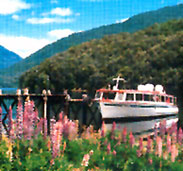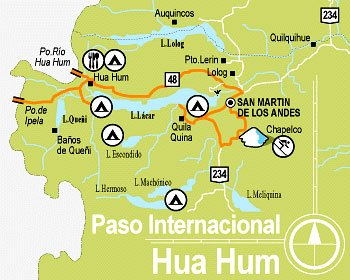Lake Queñi: a mirror for poets See map
When the Chilean writer Pablo Neruda had to begin their journey into exile, pursued by the government of his country in 1948, crossed the border by well-known Paso de los Contrabandistas, now called border cross Lipela.
After traveling for a few hours the trails in a beautiful mountain forest he reached Lake Queñi, located 10 kilometers from the border and about 60 kilometers from the city of San Martín de los Andes.

Remembering those places the poet claimed by one of his poems "...old rain forest, / give me back the aroma and the swords falling from the sky, / the solitary peace of grass and stone, / the humidity of the river margins / the smell of the larch, / the wind alive like a heart ...".
The beauty of Lake Queñi is difficult to describe. Its crystal waters are mixed between mountains reflected in the lake while the sun sets behind the ranger's house. The eponymous river drains into the thawing of the lake, and if one stays there during the time required for the spirit to perceive what happens around you will appreciate including the trout jumping to catch flies or woodpeckers working the wood of a trunk.

Maria Sol Mut Coll is the only inhabitant of the area. It is the ranger who has the task of caring for this protected area within the Lanin National Park. This is a place for conservation, i.e., to achieve that natural processes continue without human intervention. The only thing you can find there is a camping area, and from there to border cross Lipela is a "strict nature reserve", so the passing of man is prohibited.
To reach Lake Queñi from San Martin de los Andes must take the route leading to Hua Hum, pass through the edges of lakes Nonthué and Lácar and then through a narrow path made in the mountains, leading to the wooden house of the ranger.
Despite its beauty, is one of the least visited by thousands of tourists who arrive to the Lanin National Park, so it becomes an ideal place to go into a deep contact with nature. If you do not have a vehicle, the option is to sail on a boat leaving from the city to Hua Hum and then walk for a little over an hour to get to the Lake Queñi.
From then on, try to enjoy the wonders of nature in Patagonia or try to see what the Poet observed.
By Fernando Sánchez
Alojamiento en San Martín de los Andes
 Departamento Tranquera´s House
Ofrece alojamiento con vistas al jardín, wi fi gratis y estacionamiento privado gratuito.
ver másTel: San Martín de los Andes
Departamento Tranquera´s House
Ofrece alojamiento con vistas al jardín, wi fi gratis y estacionamiento privado gratuito.
ver másTel: San Martín de los AndesViajes por la Patagonia
Related Articles
© Patagonia.com.ar 2025 | Todos los derechos reservados.
